“You’re here to find a boat, right?”
So I hopped off, and the bus rumbled away — toward the faraway village and campsite I had in mind; the last bus of the day.
“Don’t worry,” said the guy, “I know someone who can host you.”
An Unexpected Guide
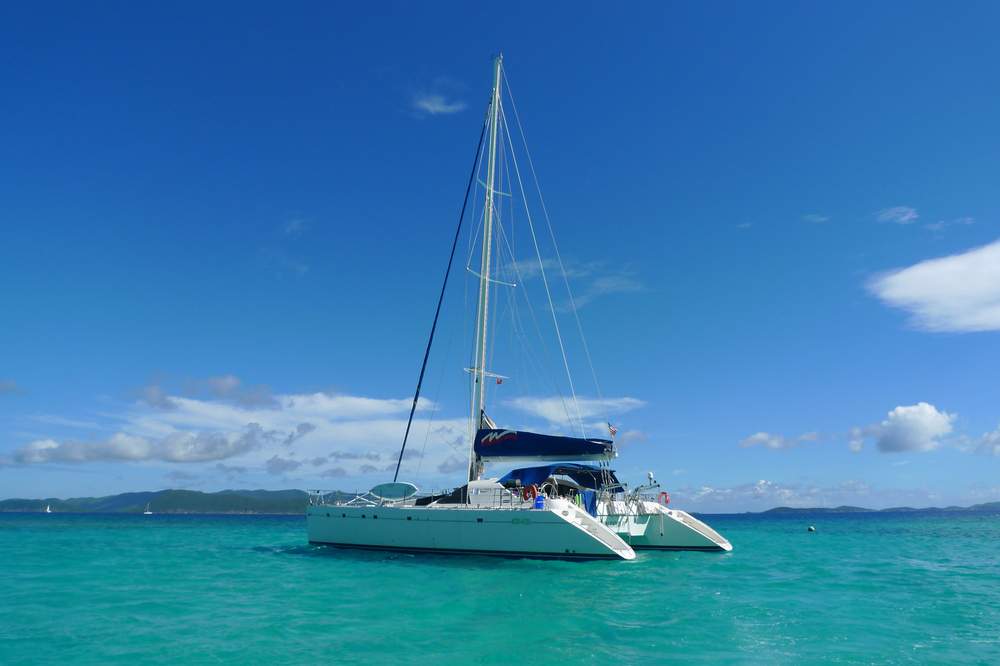
“I’m Roger. Boat hitchhiker, huh? You’re one of us. C’mon, I’ll show you the marina.”
He was Dutch, and a couple years older than I. As I struggled to keep up with his striding pace in the sweltering fragrant night of Las Palmas, he told me he was now bringing all his gear to the boat he had just found to cross the Atlantic. He was going to Brazil.
“Barely spent three days here looking. Good karma, so I felt like doing my good deed of the day. Now, you’re lucky too!”
Roger turned to me and grinned, and I caught in his eye an ecstatic glint that filled me with envy, but also with hope. I had been dreaming of finding a sailboat to cross the ocean for more than a year, before I left on that trip. Without much information, I did not know what to expect — certainly not meeting someone like him within a half-hour of my arrival in the Canary Islands. Karma, indeed.
We soon reached a large concrete bridge, five or six meters above the ground below. Without a second of hesitation, Roger threw down his backpack, then jumped on top of the large metal trash containers beneath us. “Everyone does that,” he told me with a shrug, as I scrambled after him.
“They lock the gates for the night.”
We turned a corner, and my heart skipped a beat: hundreds of masts and hulls of all sizes, a forest of lines, pier upon pier of quiet boats in the moonlight. And one of them, maybe…
As we walked along the quay toward the part of the marina where the bars and shops were still open, full of people and music, we ran into a wild-looking man with a beard, scruffy black hair, and a tipsy broken-teeth smile. The spitting image of a pirate, he only lacked an eyepatch and a wooden leg.
“Rick,” said Roger, “Do you have room on your boat tonight for someone else?”
Rick gazed at me with a look of pure kindness and joy, as if I were the Messiah; it was the sort of look you would expect from an illuminated old hermit in a mountain cave. “Why, sure! Ye’ll be sleeping in the galley with Shaggy,” he roared with a strong Yorkshire accent. “I hope you don’t mind!”
Shaggy had more than his fair share of fleas — but no, I did not mind. Not at all.
Various Strategies
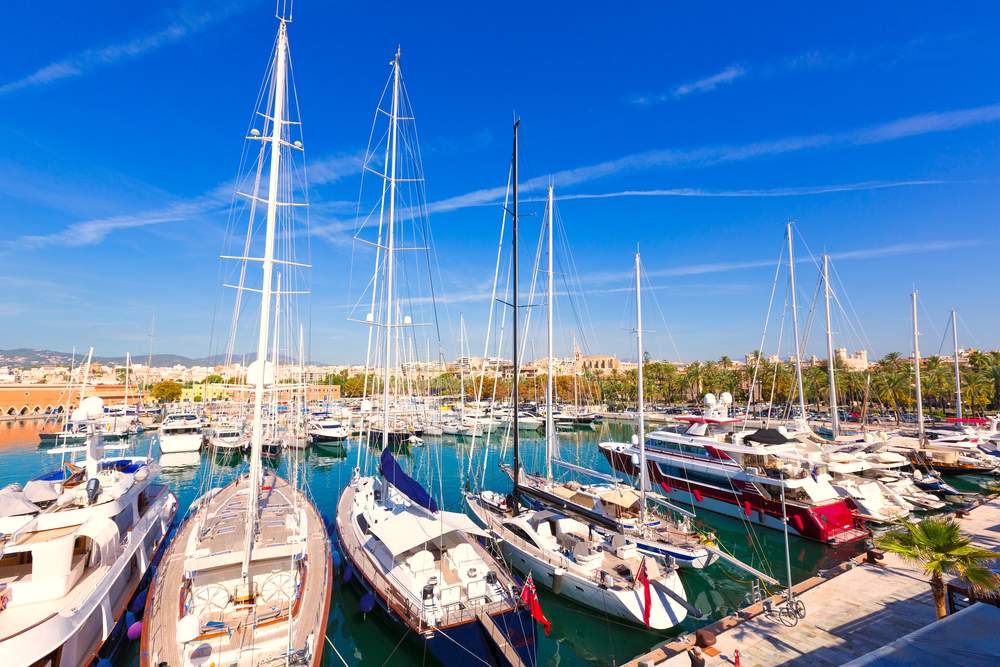
For many months in advance, I had been scouring all the relevant websites I could find, hoping to get in touch with a skipper who would be willing to take me on board (see links at bottom of article). But I only heard back from those anxious to squeeze every penny out of me for the passage, demanding exorbitant daily rates of “financial participation.” Therefore, I decided to opt for another strategy: the door to door, boat to boat approach.
Captain Diamond’s Key Advice
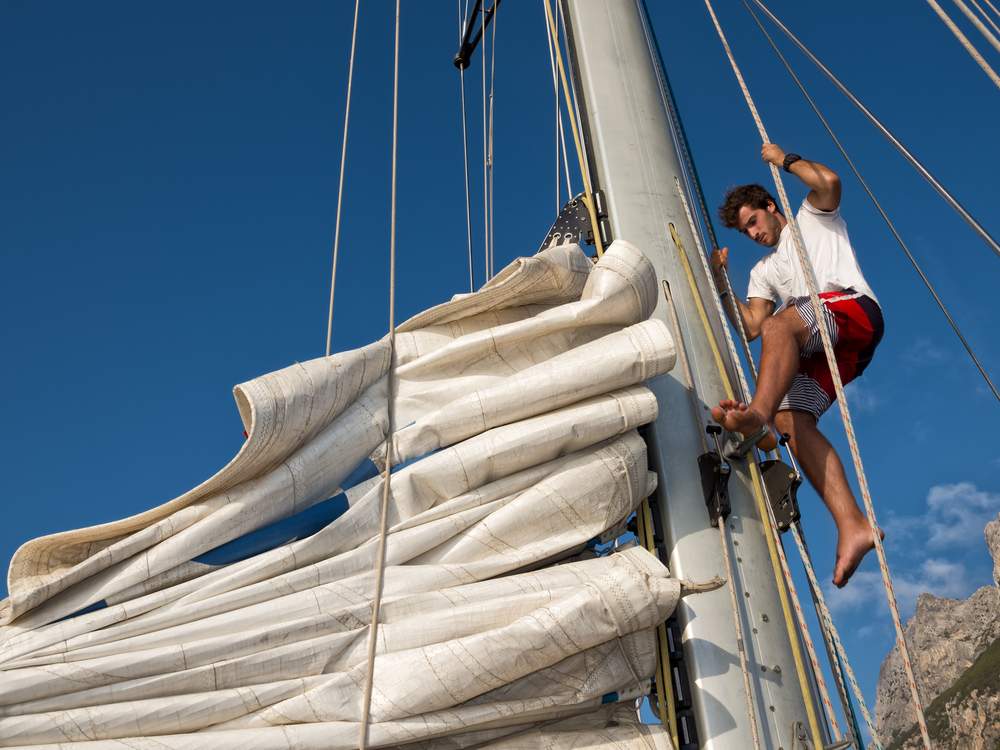
I could not help but grow worried. How long before I sailed away — if ever? I had not even set foot on a yacht before, and my entire knowledge of navigation was drawn from the contents of a book, “Sailing for Dummies,” which I was trying to assimilate in the same way one would learn surgery without ever lifting a scalpel.
Given I am not usually the most extroverted of all travellers, I was also concerned I would lack the required sociability. Happily, this was not the case — as always, a true friend is worth a dozen acquaintances. I drank beer with Rick Diamond the kindly pirate, who had spent ten years building his darling “Tin Lizzy” in northern England. As he was now putting her back into shape, I volunteered to help him with some of the cleaning and welding. A captivating conversationalist, he was full of unlikely sailing stories, and nourished a special fondness for Bob Marley and funny cigarettes.
“Do you go around the boats in that shirt, mate?”
I was wearing my beloved green Brazilian football t-shirt, and its collar had come out somewhat deformed from a scuffle with an Iranian bus driver.
Rick leaned forward like a conspirator, and whispered: “Ye’re shooting yerself in the foot, mate! Do you think all the skippers around are like ol’ Rick Diamond? Well they’re not! You got t’show’em you’re a gentleman, understand? Wear yer very best garb!”
I glanced around us and understood. Everyone in the Sailor’s Bar was either a hitchhiker or a “yottie,” but the two groups hardly mingled. And anyone could tell them apart: the former looked more juvenile, of course, but also gave an image of happy-go-lucky drifters, with peculiar clothes or juggling sticks — it was plain to see the skipper crowd belonged to another world. Suddenly, Roger’s spick-and-span appearance made sense. I decided to wear my cleanest shirt the following day.
Troubadours of the Seas
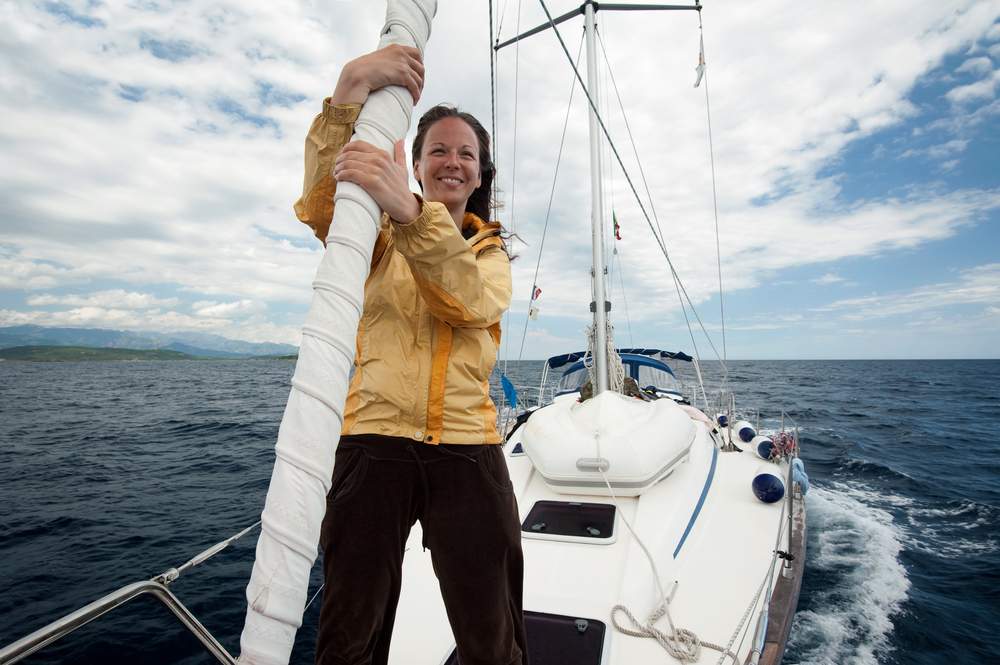
The spontaneous kindness I received from Roger and Rick on my arrival was characteristic of the spirit prevalent among this transient but tightly-knit community of Dharma bums. In practice, we were competing against each other for boats headed to the same parts of the world, yet we believed in solidarity. Strong friendships were born there, to the extent that some people even decided they would leave the place together, or not at all. We shared every bit of information we had on the latest arrivals and departures, on those who succeeded and those who gave up. And most importantly, we helped each other get by in the expensive city of Las Palmas, where few of us could afford a hotel room.
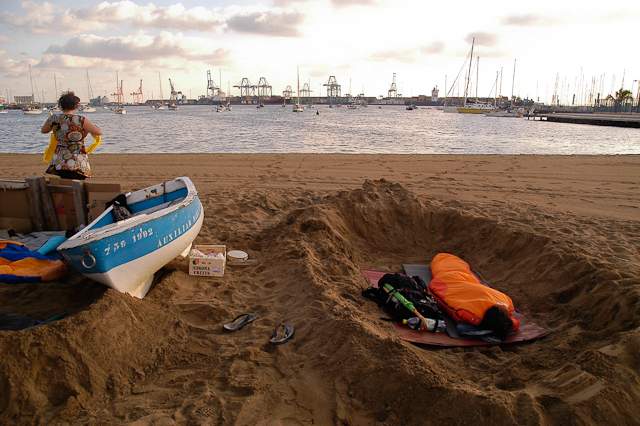
Thomas found a guitar, Alex played the flute, someone sang along, and we talked and drank. It grew late and stomachs grumbled. Like a merry band of medieval troubadours, whistling, howling, and banging on tambourines, we launched ourselves onto the unsuspecting streets of Las Palmas, in quest for food. That night, I was taught the subtle art of scrounging. My companions guided me to the big trash containers at the back of certain supermarkets, where all the products of the day past their use-by dates had just been discarded, and from which we dug out astonishing quantities of unspoilt fruit, vegetables, cheese, and bread.
Then they took me on a tour of the cafeterias and grocery stores where, swallowing my shame, I learnt to walk up to waiters or cashiers and humbly ask if they would have something I could “recycle,” as the Spanish has it — and to walk out, speechless, with a freshly-made sandwich, a cake, or a full plate of delicious Middle Eastern fare. Most of my friends, just like me, probably had the means to pay for each of those. But the key factor was time — none of us had any idea how long the wait would last in this costly touristic destination.
We gathered on the beach near the marina, where homeless fishermen also spent the night, sleeping beside their barks. We invited them to join us, and feasted happily — our supplies were so copious, in fact, that much was left over for the following day. Then we spread our sleeping bags on the sand, and fell asleep under the warm night sky. Watching the beam of a lighthouse sweeping through the moist air, I felt how very little I knew about life.
Westward Ho!
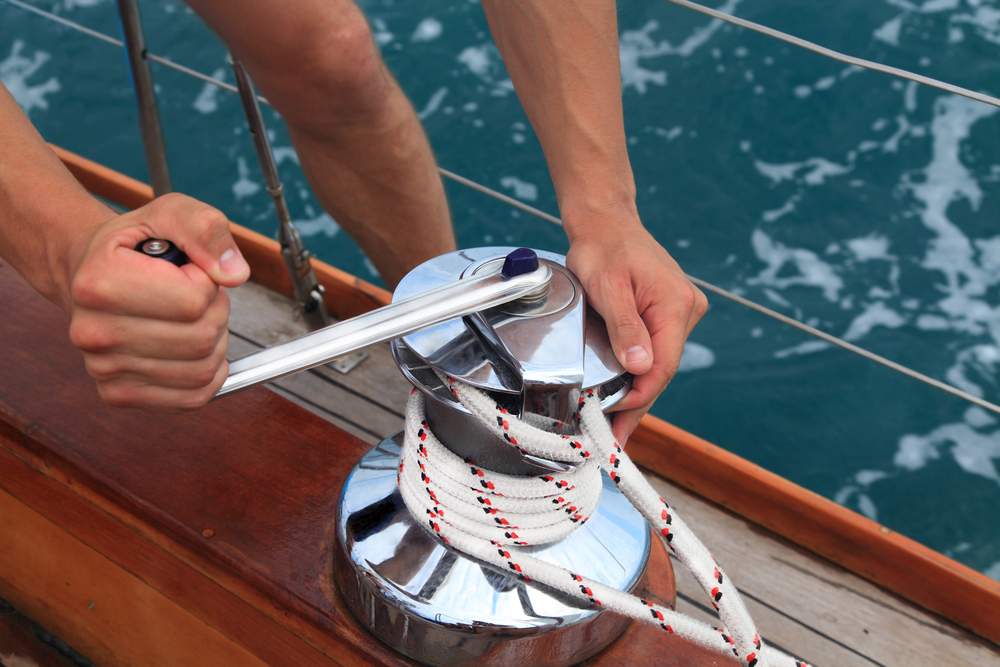
“You’re here to find a boat, right?”
I had never seen him before. A short muscular old man, he spoke to me as I was walking away from the Sailor’s Bar two days later.
“Come and meet us on our boat tomorrow.”
He was French, en route to the Caribbean with his wife and a friend, on a superb 37-foot catamaran. They needed an extra crew member to stand watch at night. Not only did they decide to take me on board, they also left me free to choose how much I was willing to pay for the crossing. I was astonished.
When I asked Marc why he picked me, he shrugged. “You looked clean.”
We set sail from Las Palmas on the morning of my fifth day there, at dawn.
Practical Information
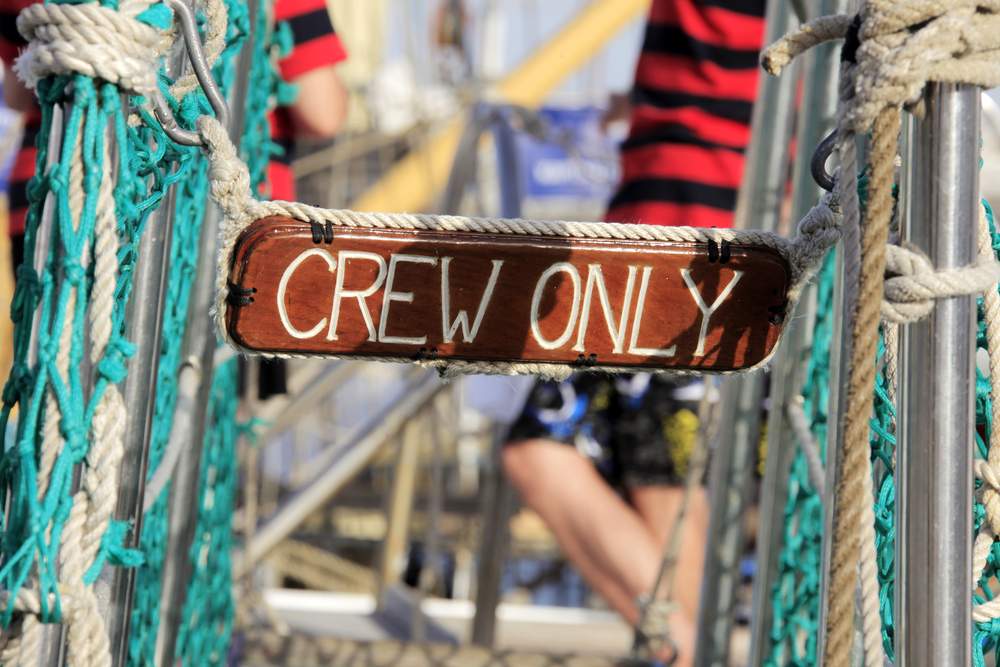
Getting into the Canaries
At the time of writing, a one-way ticket in a Pullman seat without a vehicle cost around 165 Euros. The journey takes thirty hours and is very comfortable (free Wi-Fi on board, swimming-pool, etc.)
Naturally, it is also possible to hitch a boat ride to Las Palmas from the Spanish or Portuguese coast if you want to start practicing.
How long does it take?
How much does it cost?
If one is hired specifically to take on a particular job (as a cook, a musician, a baby-sitter, etc.), which is most likely to happen on large luxurious yachts, one should obviously expect to be paid for this work, especially when hired on a full-time basis. On the contrary, anyone coming on board as a regular passenger, i.e., not expected to take part in any activity remotely linked to the maneuvering or maintenance of the boat, will probably have to pay for this status a rather hefty sum (20 to 25 euros a day, at the very least).
Many skippers, especially those who advertise on Internet platforms, expect their crew members to pay up to 20 or 30 euros a day; however, such rates should be those applied to paying passengers, with the right to expect certain guarantees in terms of insurance.
Where to search
Crewing websites
- www.findacrew.net (includes free and paying subscriptions)
- www.crewrecruit.com
- www.desperatesailors.com
- www.7knots.com
- Float Plan
- www.crewseekers.net
- www.crewbay.com
Other useful links
- www.cruiserlog.com and www.cruisersforum.com: Two excellent forums to gather all sorts of information on the art of sailing. Most users are very knowledgeable “yotties.”
- www.cruiserswiki.org: Participative encyclopaedia of sailing and boat hitchhiking.
- www.noonsite.com: “The global site for cruising sailors” has lots of relevant information, often geared towards skippers (including reports on piracy incidents).
- www.yachtmollymawk.com/2011/03/hich-hiking-across-the-atlantic: Aboard the yacht “Mollymawk,” a couple of English parents spent the last 25 years raising their three children at sea. This article provides an enlightening perspective on boat hitchhiking, from the point of view of skippers who really do not want any hitchhikers on board… and want you to understand why!
To read about hitch-hiking and other interesting adventures on the road, check out the following articles:
- Budget Travel by Bike: Why It’s the Best (and How You Can Do It for $14 Per Day)
- 8 Ways to Travel for Free on Your RTW Trip
- 8 Tips for the Newbie Hitchhiker
- The Complete Guide to Hitchhiking in Southern Africa
- Hitchhiking in Japan: It’s Almost Too Easy
Photo credits: SilvanBachmann , Dim154 , Federico Rostagno , Leonard Zhukovsky , Policas , holbox , Ventura
Beach Camping Photo: Courtesy of the author and may not be used without permission.
